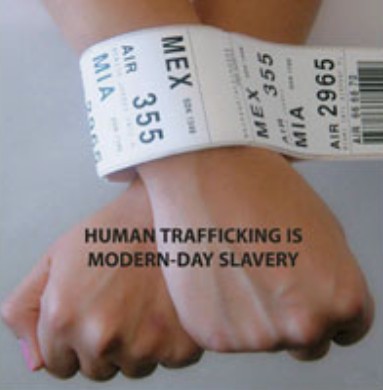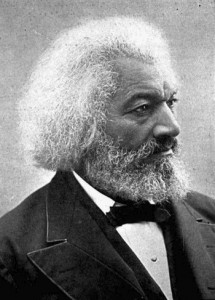Holy Roman Emperor Otto the Great[i] did not invent slavery, but his conquest of the Slavonic peoples during the 10th century CE did produce the English term “slave,”[ii] which derived from the Latin term “sclavus.”[iii] The Latin language has also contributed a pair of verbs — “abolish”[iv] and “educate”[v] — that highlight the valuable contribution that the stories of victims can make in the battle against slavery and its modern successor, human trafficking or trafficking in persons.
The abolitionist movement began in England near the end of the 18th century.[vi] Frederick Douglass became one of the leaders of that movement in the United States of America,[vii] and September 3, 2011, will mark the 173rd anniversary of his escape from slavery.[viii] As a lecturer, writer, and publisher,[ix] Douglass contributed his story[x] to the effort to abolish slavery in the United States.
Today organizations such as the Frederick Douglass Family Foundation[xi] emphasize the importance of education[xii] as a way to contribute to the effort to liberate modern-day slaves — the victims of human trafficking. As we approach the anniversary of Douglass’s liberation, we can all participate in that education by writing, reading, speaking, or listening.
Very few of the countless victims of human trafficking will ever have an opportunity to tell the story of their enslavement. If we pay attention to the stories that are available, however, each of them can make a valuable contribution to the effort to educate our communities about human trafficking.
______________
[i] “Otto I, Holy Roman Emperor,” Wikipedia, last modified July 5, 2011,http://en.wikipedia.org/wiki/Otto_the_Great.
[ii] “The name ‘Slav’ meant glory; its offshoots include ‘Slovak,’ ‘Slovene,’ ‘Slavonian,’ ‘Czechoslovakia.’ In A.D. 955 Holy Roman Emperor Otto the Great conquered the Slavs; hence [English] ‘slave,’ ‘slavery.’” Joseph T. Shipley, The Origins of English Words: A Discursive Dictionary of Indo-European Roots, (Baltimore: Johns Hopkins University Press, 1984), s.v. “kleu I” (italics replace by single quotation marks).
[iii] Merriam-Webster OnLine, s.v. “slave,” accessed August 5, 2011,http://www.merriam-webster.com/dictionary/slave.
[iv] Merriam-Webster OnLine, s.v. “abolish,” accessed August 5, 2011,http://www.merriam-webster.com/dictionary/abolish.
[v] Merriam-Webster OnLine, s.v. “educate,” accessed August 5, 2011,http://www.merriam-webster.com/dictionary/educate?show=0&t=1312396601.
[vi] “Origins of Abolitionism,” Cornell University Library, accessed August 5, 2011, http://rmc.library.cornell.edu/abolitionism/origins.htm.
[vii] “Frederick Douglass,” Library of Congress, accessed August 5, 2011,http://www.americaslibrary.gov/aa/douglass/aa_douglass_subj.html.
[viii] “On September 3, 1838, abolitionist, journalist, author, and human rights advocate Frederick Douglass made his dramatic escape from slavery, traveling north by train and boat, from Baltimore, through Delaware to Philadelphia. That same night he took a train to New York, where he arrived the following morning.” Angela McMillian, comp., “Frederick Douglass: Online Resources,” Library of Congress, accessed August 5, 2011,http://www.loc.gov/rr/program/bib/douglass/.
[ix] “Frederick Douglass Home Page,” Library of Congress, accessed August 5, 2011, http://memory.loc.gov/ammem/doughtml/doughome.html.
[x] The website Library of Congress currently offers links to online versions of the autobiographies of Frederick Douglass. “Frederick Douglass Papers: In His Own Words,” Library of Congress, accessed August 5, 2011,http://memory.loc.gov/ammem/doughtml/words.html.
[xi] “Frederick Douglass Family Foundation,” accessed August 5, 2011,http://www.fdff.org/.
[xii] “Education,” Frederick Douglass Family Foundation, accessed August 5, 2011, http://www.fdff.org/education.html.








































